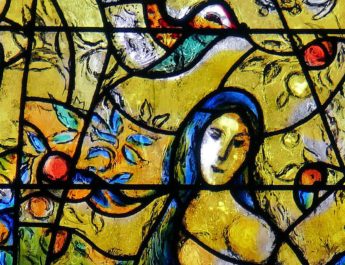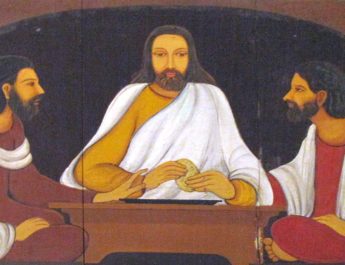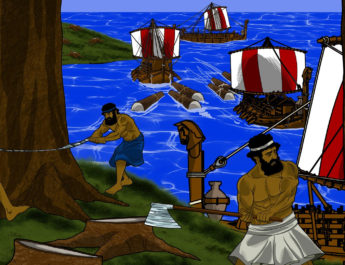1 Samuel 14:49-51 & 18:17-21, 29
A Women’s Lectionary 39
14:49 Now the sonsA of SaulB wereC Jonathan,D Ishvi,E
A “sons” = ben. From banah (to build or obtain children). This is son, age, child. It is son in a literal or figurative sense.
B “Saul” = Shaul. From shaal (to ask, inquire, beg, borrow, desire, request; can also mean demand). This is Saul or Shaul, meaning “asked of the Lord.”
C “were” = hayah. This is to be or become, to happen.
D “Jonathan” = Yonathan. Related to “were” in v14:49. From the same a Yehonathan (Jonathan, Jehonathan; “the Lord has given”); {from YHVH (proper name of the God of Israel; God, Lord; the self-existent or eternal one); {from havah (to become) or hayah (see note C above)} + natan (to give, put, set, offer; to give literally or figuratively)}. This is Jonathan of Yonathan, meaning “the Lord has given.”
E “Ishvi” = Yishvi. Related to “were” and “Jonathan” in v14:49. 4x in OT. From shavah (to equalize, resemble, agree with, compare, adjust, compose, place, or yield) OR from ish (man); {perhaps from enosh (human, humankind, mortal); from anash (to be weak, sick, or frail} + yah (the shortened form of the name of the God of Israel; God, Lord); {from YHVH (see note D above)}. This is Yishvi or Ishvi, meaning “level” or “equal” or “man of the Lord.” See https://www.abarim-publications.com/Meaning/Ishvi.html
and Malchishua,F and the namesG of his twoH daughtersI were these:
F “Malchishua” = Malkishua. 5x in OT. From melek (king, royal); {from malak (to be or become king or queen, to rise to the throne, to be crowned; by implication, to take counsel)} + shua (perhaps riches); {from yasha (to deliver, defend, help, preserve, rescue; properly, to be open, wide or free, which implies being safe; in a causative sense, to free someone)}. This is Malkishua or Malchishua, meaning “my king is wealth” or “the king is salvation” or “king of help” or “my king is opulence.” See https://www.abarim-publications.com/Meaning/Malchi-shua.html
G “names” = shem. May be from sum (to put, place, set). This is name, fame, renown. A name was thought to indicate something essential about a person – something about their individuality. So, this word can also mean honor, authority, or character.
H “two” = shenayim. From sheni (double, again, another, second); from shanah (to fold, repeat, double, alter, or disguise). This is two, both, second, couple.
I “daughters” = bat. Related to “sons” in v14:49. From ben (see note A above). This is daughter in a literal or figurative sense.
the name of the firstbornJ was Merab,K and the name of the youngerL was Michal.M
J “firstborn” = bekirah. 6x in OT. From bakar (to bear fruit, be firstborn, firstling, that which opens the womb, give the birthright to). This is firstborn – specifically referring to a firstborn daughter.
K “Merab” = Merab. 3x in OT. From rabab (to be or become much or many, multiply). This is Merab, meaning “increase” or “multiplication” or “agent of greatness.” See https://www.abarim-publications.com/Meaning/Merab.html
L “younger” = qatan. From quwt (grieved, cut off, to detest). This is least, small, young, little one. It is literally smaller whether in amount or size. Figuratively it is smaller in the sense of younger or less important.
M “Michal” = Mikal. 18x in OT. Perhaps from the same as mikal (stream, container, brook); {from yakol (to be able, endure, overcome, prevail)} OR from mi (who) + k– (like) + el (God, a god). This is Michal, whose name may mean “rivulet” or “who is like God” or “what is like God?” See https://www.abarim-publications.com/Meaning/Michal.html
50 The name of Saul’s wifeN was AhinoamO daughter of Ahimaaz.P
N “wife” = ishshah. Related to “Ishvi” in v14:49. Perhaps from ish (see note E above). This is woman, wife, or female.
O “Ahinoam” = Achinoam. 7x in OT. From ach (brother, kindred, another, other, like) + noam (pleasantness, beauty, favor, agreeableness, delight, splendor, or grace); {from naem (to be pleasant, beautiful, sweet, or agreeable in a literal or figurative sense)}. This is Achinoam or Ahinoam, meaning “my brother is delight” or “brother of pleasantness” or “kindred to sweetness” or “brother of grace” or “a delightful ally.” See https://www.abarim-publications.com/Meaning/Ahinoam.html
P “Ahimaaz” = Achimaats. Related to “Ahinoam” in v14:50. 15x in OT. From ach (see note O above) + maaz (to be enraged). This is Achimaats or Ahimaaz, meaning “my brother is wrath” or “brother of anger.” See https://www.abarim-publications.com/Meaning/Ahimaaz.html
And the name of the commanderQ of his armyR was AbnerS son of Ner,T Saul’s uncle;U
Q “commander” = sar. This is chief, leader, ruler, lord, official, governor, prince, military leader. It refers to someone at the top of a rank or class.
R “army” = tsaba. From tsaba (to wage war, serve, assemble, fight, perform, muster, wait on). This is a large group of persons (used figuratively for a group of things). It implies a campaign literally as with army, war, warfare, battle, company, soldiers. Can also be used figuratively for hardship or for worship.
S “Abner” = Abner. From ab (father in a literal or figurative sense – grandfather, chief, ancestor) + ner (properly, to glisten; a lamp, light, burner, candle; light literal or figurative). This is Abner, a name meaning “my father is a lamp,” “father of light,” “enlightening.”
T “Ner” = Ner. Related to “Abner” in v14:50. 16x in OT. From the same as ner (see note S above). This is Ner, meaning “lamp.”
U “uncle” = dod. This may come from a word that means to boil. It is love or lover. It can also refer to one who is beloved, like an uncle, or a love-token.
51 KishV was the fatherW of Saul, and Ner the father of Abner was the son of Abiel.X
V “Kish” = Qish. Perhaps from qush (to set a trap, lure, ensnare); perhaps from yaqosh (to set a snare in a literal or figurative sense; a fowler). This is Kish or Qish, meaning “a bow” or “snaring” or “bird catcher.” See https://www.abarim-publications.com/Meaning/Kish.html
W “father” = ab. Related to “Abner” in v14:50. See note S above.
X “Abiel” = Abiel. Related to “Abner” in v14:50 & “father” in v14:51 & “Michal” in v14:49. 3x in OT. From ab (see note S above) + el (see note M above). This is Abiel, meaning “El is my father” or “God is my father.”
18:17 Then Saul said to David,Y “HereZ is my elderAA daughter Merab; I will giveBB her to you as a wife;
Y “David” = David. Related to “uncle” in v14:50. From the same as dod (see note U above). This implies someone you love such as a friend, a lover, or a close family member like an uncle. David’s name likely means something like “beloved one.”
Z “here” = hinneh. From hen (lo! Behold! If, though; an expression of surprise). This is to draw attention, show suddenness or surprise, or to emphasize the importance of the coming statement. See! Lo! Behold!
AA “elder” = gadol. From gadal (to grow up, become great, become wealthy – to advance. The root meaning may be to twist in the sense of the process of growing). This is great, high, bigger, noble, old, marvelous. It can also refer to someone who is powerful or distinguished.
BB “give” = natan. Related to “Jonathan” in v14:49. See note D above.
only be valiantCC for me and fightDD the Lord’sEE battles.”FF
CC “valiant” = ben + chayil. Literally, “a son of valor.” Ben is the same as “sons” in v14:49. See note A above. Chayil is from chul (to be firm, strong, prosperous; to endure). This is strength, wealth, ability, activity. It can refer to soldier or a company of soldiers as well as goods. It is a force of people, means, or goods. It can speak of valor, virtue, or strength.
DD “fight” = lacham. This is to eat or feed on. Figuratively, it is to battle as a kind of consumption/destruction.
EE “Lord’s” = YHVH. Related to “were” and “Jonathan” and “Ishvi” in v14:49. See note D above
FF “battles” = milchamah. Related to “fight” in v18:17. From lacham (see note DD above). This is battle, war, fighting, or one who fights (i.e. a warrior).
For Saul thought, “I will not raiseGG a handHH against him; let the PhilistinesII dealJJ with him.”
GG “raise” = hayah. Same as “were” in v14:49. See note C above.
HH “hand” = yad. This is hand, ability, power. Hand in a literal sense, but also what one can do or the means by which one does it.
II “Philistines” = Pelishti. From Pelesheth (Philistia); from palash (to mourn, wallow, maybe roll in). This is Philistines. Their name may mean “griever” or “burrower” or “weakener.” See https://www.abarim-publications.com/Meaning/Philistine.html.
JJ “deal” = hayah. Same as “were” in v14:49. See note C above.
18 David said to Saul, “Who am I, and who are my kinsfolk,KK my father’s familyLL in Israel,MM that I should be son-in-lawNN to the king?”OO
KK “kinsfolk” = chay. From chayah (to live or keep alive literally or figuratively). This is alive, living, lifetime. It can also be used to describe someone’s age. It can refer to animals, plants, water, or a company or congregation of people. It is life in a very broad sense.
LL “family” = mishpachah. From the same as shiphcah (maid, maidservant); root means to spread out. This is one’s circle of relatives – clan, family, kindred.
MM “Israel” = Yisrael. Related to “Michal” in v14:49 & “Abiel” in v14:51. From sarah (to persist, exert oneself, contend, persevere, wrestle, prevail) + el (see note M above). This is Israel, meaning God strives or one who strives with God; new name for Jacob and for his offspring. This refers to the people and to the land.
NN “son-in-law” = chathan. From chathan (to intermarry, make an alliance through marriage, father-in-law, son-in-law, give one’s daughter in marriage). This is bridegroom, son-in-law. It is someone who is related through marriage. Figuratively, it can be a child who is circumcised
OO “king” = melek. Related to “Malchishua” in v14:49. See note F above.
19 ButPP at the timeQQ when Saul’s daughter Merab should have been given to David, she was given to AdrielRR the MeholathiteSS as a wife.
PP {untranslated} = hayah. Same as “were” in v14:49. See note C above.
QQ “time” = eth. Probably from anah (to answer, sing, announce); from ad (forever, all, old); from adah (to pass on, advance, decorate oneself). This is a period or season. It can also mean whenever or continually.
RR “Adriel” = Adriel. Related to “Michal” in v14:49 & “Abiel” in v14:51 & “Israel” in v18:18. 2x in OT. From adar (to dig, help, keep rank; properly, to muster troops as for battle; to miss or lack since you can see who is missing following muster; to arrange like a vineyard and so to hoe) or from eder (arrangement – of animals, a flock or herd); {from adar (to be missing, fail)} + el (see note M above). This is Adriel, meaning “my help is God” or “flock of God.”
SS “Meholathite” = Mecholathi. 2x in OT. Perhaps from Abel Mecholah (Abel-meholah or Abel Mecholah, meaning “meadow of dancing”); {from abel (meadow, plain – grassy) + mecholah (dancing, a company); {from machol (round dance); from chul (whirling around so dancing as in a circle or writhing in pain; used particularly for the pain of childbirth or from writhing due to fear; can also be falling in pain or waiting)} OR from machashabah (thought, scheme, imagination, purpose, or a plan either good or evil); from chashab (literally to weave; figuratively to think or plot something malicious). This is Meholathite, which is someone from Abel-meholah.
20 Now Saul’s daughter Michal lovedTT David. Saul was told,UU and the thingVV pleasedWW him.XX
TT “loved” = aheb. This is to love, beloved, friend. It is to have affection for sexually or otherwise.
UU “told” = nagad. This is to declare, make conspicuous, stand in front, manifest, predict, explain.
VV “thing” = dabar. From dabar (to speak, declare, discuss). This is speech, a word, a matter, an affair, charge, command, message, promise, purpose, report, request. It is a word, which implies things that are spoken of in a wide sense.
WW “pleased” = yashar. This is to be straight, right, even, smooth, or agreeable. Figuratively, it can be to make something pleasant or prosperous.
XX “him” = ayin. Literally, “in his eyes.” This is eye in a literal or figurative sense so eye, appearance, favor, or a fountain (the eye of the landscape).
21 Saul thought, “Let me give her to him that she may be a snareYY for him and that the hand of the Philistines may be against him.”
Therefore Saul said to David a secondZZ time, “You shall nowAAA be my son-in-law.”BBB
YY “snare” = moqesh. Related to “Kish” in v14:51. From yaqosh (see note V above). This is bait, barb, snare, trap; a noose or hook to trap animals in a literal or figurative sense.
ZZ “second” = shenayim. Same as “two” in v14:49. See note H above.
AAA “now” = yom. Root may mean being hot. This is the day in a literal or figurative sense. It can also mean birth, age, daylight, continually or other references to time.
BBB “be…son-in-law” = chathan. Related to “son-in-law” in v18:18. See note NN above.
29 Saul was still moreCCC afraidDDD ofEEE David. So Saul was David’s enemyFFF from that time forward.GGG
CCC “more” = yasaph. This is to add, increase, continue, exceed.
DDD “was…afraid” = yare. This is to fear, be afraid, dreadful. It can also refer to fearful reverence – to fear in a moral sense is to say to revere, respect.
EEE “of” = paneh. From panah (to turn, face, appear). This is face in a literal or figurative sense. It could be face, presence, anger, respect. It can also be used of God to indicate divine favor or presence.
FFF “enemy” = oyeb. From ayab (to hate or be hostile to). This is a foe or enemy as one that you are hostile to.
GGG “from that time forward” = kol + yom. Literally, “all days.” Kol is from kalal (to complete). This is all or every. Yom is the same as “now” in v18:21. See note AAA above.
Image credit: “Reverie in the Night” by Alphonse Osbert, 1895.




